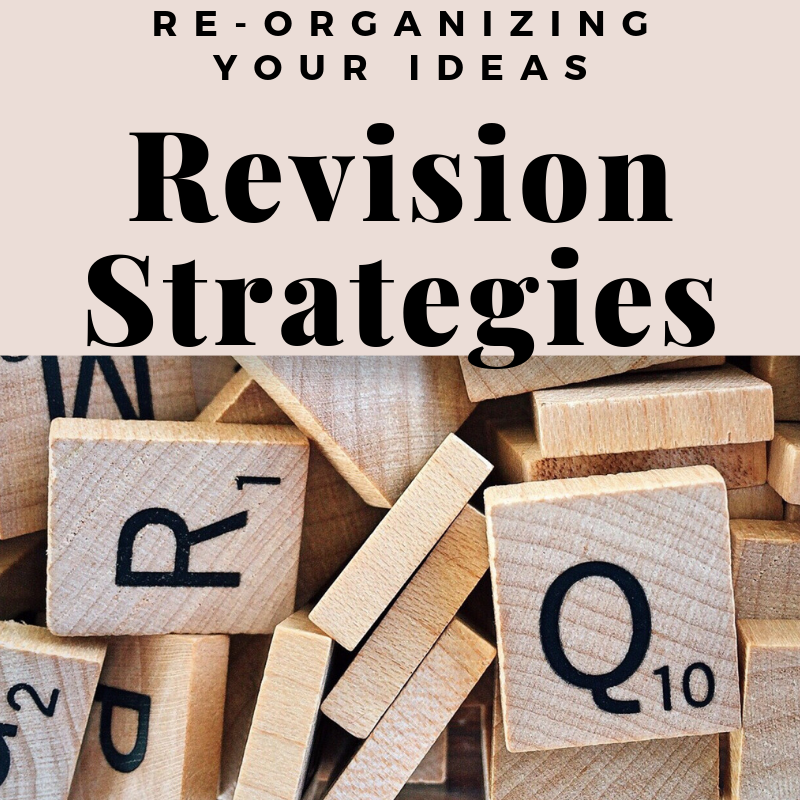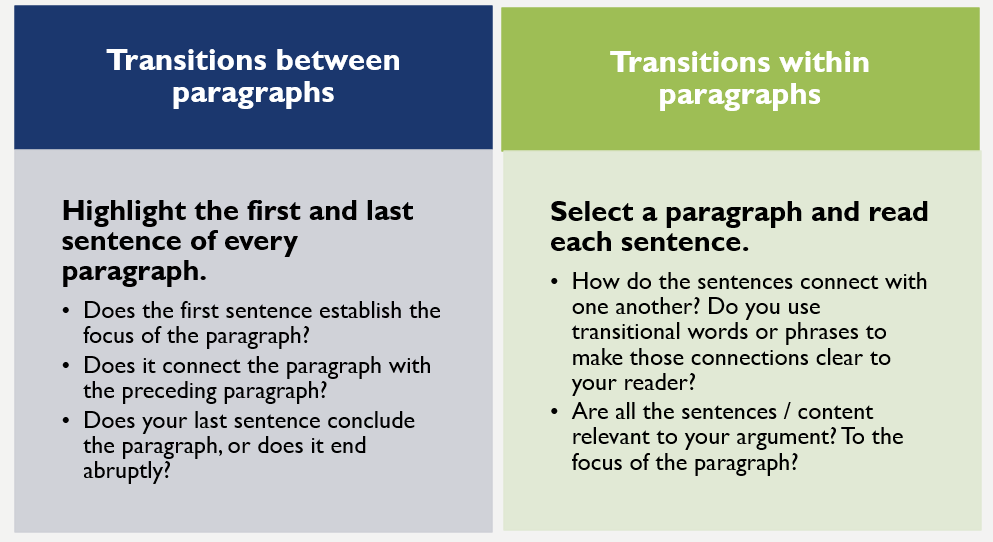Revision is a key element of the writing process, allowing you to re-vision—or re-see—your work from a new perspective and envision how it might work more effectively. As such, revision often focuses on big picture elements such as the organization of your ideas, your argument and supporting evidence, and the clarity of your ideas and analysis. Revision can take place frequently throughout your writing process, as you incorporate feedback from others and review your work on your own. Below, we provide guidance on:
- Deciding What to Revise
- Revising Your Argument
- Revising Your Evidence and Source Use
- Revising Your Organization
Deciding What to Revise

There are many starting points to begin your revision process, including:
- Previous feedback on your draft from your instructor, your peers, and / or the Writers Workshop
- Class assignment documents such as your prompt, the rubric, and other resources from class, all of which can help you determine what to prioritize in your process
- Reading your work aloud
- Setting your draft aside so that you can return to it later with a fresh perspective
Revising Your Argument
Arguments play a central role in U.S. academic writing and typically reflect the key claim(s) you’re making in your work. In your revision process, then, it’ll often be important to ensure both that you have have a clearly stated argument and that your argument is well-supported by evidence. To do so, you can:
- Identify what your argument is and where it is located
- Ask yourself whether your argument will be clear to your audience as well. (Better yet, get feedback from a friend or Writers Workshop consultant!)
- Review your use of sources and/or evidence. Is your argument convincing? Do you support your argument with strong evidence?
- Address and refute counterarguments
Revising Your Evidence
First, read your paper and highlight every instance where you summarize, quote, or refer to sources. What do you notice overall? Are you using too many sources? Too few sources? Are you analyzing them? Are you connecting them to your argument? Using these observations, determine which of the following you want to focus on in your revisions.

Revising the Amount of Source Material
- Have you used enough sources to support your argument?
- Are there points that could be made clearer or could be better supported by additional sources or additional information from sources?
Revising Summary and Analysis of Sources
- Are you clearly analyzing the source and explaining its connections to your argument?
- Too much summary might indicate you need more examples or analysis
- Too many quotes might indicate you need more analysis
- Not enough examples or quotes might indicate you need more support for your argument
Revising Your Use of Evidence
- Does each example or source have a purpose?
- Do you introduce each source or example?
- Do you explain your evidence’s connection to your argument?
- Are you citing all ideas and language that come from sources?
- Have you included a works cited or reference page providing complete citations for each source you used?
Revising the Kind of Sources You’re Using
- Are you using evidence and examples that your audience will find convincing?
- Are your sources reliable?
- Do you need additional sources or evidence to strengthen support for your argument?
Revising Your Organization
Effective organization relies on both your overall structure of ideas, including the relevance and order of information, as well as how you move between ideas via your transitions between and within paragraphs.

Revising the Overall Structure
- Read each paragraph of your paper. In the margins of your paper, write the focus or theme of each paragraph. Then, write how the paragraph connects with your argument.
- Outline (or reverse outline) your paper, including the main ideas of each paragraph and your supporting points or evidence.
- Do you present your ideas in a logical order based on your argument? Could ideas or paragraphs be rearranged to make your ideas clearer or to more strongly support your argument?
Revising Individual Paragraphs
If you’re having trouble identifying the focus of a paragraph, that suggests you may need to work on the revision of individual paragraphs.
- Try to write a topic sentence that tells your reader what they’re supposed to conclude from this paragraph.
- Reread the individual sentences of the paragraph. Where do you shift focus in the paragraph? What topics are you trying to cover in each sentence? Do they relate to one another? Do they need to be rearranged?
Revising Transitions between Paragraphs

Related Links:
